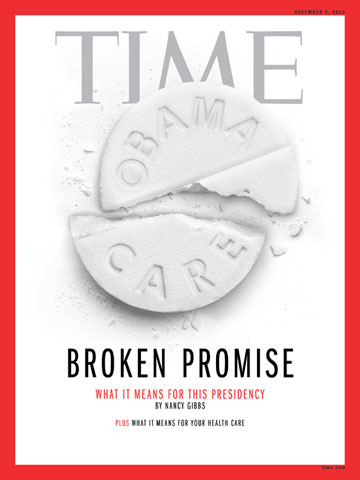
(2 of 6)
"Everything hangs in the balance," says Brookings Institution senior fellow William Galston, a key policy adviser in the Clinton Administration, who argues that Obama cannot change the topic and shouldn't even if he could. "The ACA is the signature achievement of his Administration and one of the biggest promissory notes ever handed the American people. It is not only his moral obligation to deliver on that promise but an absolute political necessity. Nothing else is going to be feasible until he rights the ship. It's just as simple as that."
Broken Promises
The rituals of presidential contrition are fixed and formal: confess the sin, express regret, make amends and, if necessary, perform a human sacrifice, preferably on a fairly high-ranking human. In his extraordinary Nov. 14 press conference and in private meetings, Obama has admitted how badly the launch has gone, how ignorant he was of the website problems, how much trouble he has caused fellow Democrats and how little confidence he has that everything will be working properly soon. He feels bad for the people getting insurance-cancellation notices who can't even go online to see if they qualify for a better policy. His verb of choice is fumbling; he fumbled the health care rollout.
But all reforms have winners and losers; throwing people off cheap, no-frills plans is central to making the Affordable Care Act work. This is not a fumble--it's a core feature. Some people will have to buy more coverage than they want or need to offset the older and sicker people who cost insurers more. Everyone in Washington knew this, so the policy's defenders are reduced to arguing that people should have realized Obama was sugarcoating things when he sold the policy as a way to cover a majority of the country's 48 million uninsured without inconveniencing anyone else.
Yet there is policy and there is politics, and the backlash was so fierce among Democrats that Obama had to reverse course, even if his backpedaling was likely to cause further fumbles down the field. He announced that the canceled policies could be extended for one more year, but that assumes insurers and state regulators go along. Experts warned that his fix could drive premiums up and cost taxpayers more if the government has to reimburse insurers for unexpected losses. State insurance commissioners argued that the President's reversal just added more chaos and complexity to an already complex system. "It's going to make pricing for next year a problem," says Kansas insurance commissioner Sandy Praeger. "When there's uncertainty, plans will take the conservative route and have higher premiums than perhaps they need."
